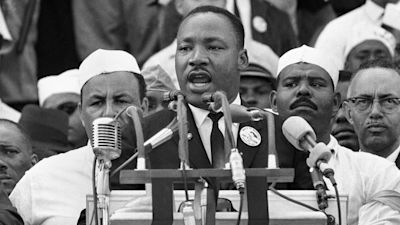What was Martin Luther King's 'I Have A Dream' speech about and why was it revolutionary?

Thousands of civil rights activists are expected to gather in Washington to protest against police brutality and violence, as outrage continues over the police shooting of a black man in Wisconsin.
The march comes on the commemoration of Rev. Martin Luther King, Jr's 1963 March on Washington for Jobs and Freedom.
On August 28 1963, an interracial assembly of more than 200,000 people gathered peaceably in the shadow of the Lincoln Memorial to demand equal justice for all citizens under the law.
Thousands will be gathering at the steps of the Lincoln Memorial once again on Friday, where the Rev. King, Jr. delivered his historic "I Have A Dream" address - a vision of racial equality that remains elusive for millions of Americans.
What exactly was Martin Luther King's speech about?
Crowds were uplifted by the emotional strength of King’s famous "I Have a Dream" speech, in which he emphasised his faith that all men, regardless of race, would someday be brothers.
During his speech, Rev. King said: "I say to you today, my friends, so even though we face the difficulties of today and tomorrow, I still have a dream. It is a dream deeply rooted in the American dream."
"I have a dream that one day this nation will rise up and live out the true meaning of its creed, 'We hold these truths to be self-evident; that all men are created equal'."
"I have a dream that one day on the red hills of Georgia the sons of former slaves and the sons of former slave owners will be able to sit down together at the table of brotherhood."
Rev. King continued: "I have a dream that one day even the state of Mississippi, a state sweltering with the heat of injustice, sweltering with the heat of oppression, will be transformed into an oasis of freedom and justice."
"I have a dream that my four little children will one day live in a nation where they will not be judged by the colour of their skin but by the content of their character."
"I have a dream today."
"I have a dream that one day down in Alabama, with its vicious racists, with its governor having his lips dripping with the words of interposition and nullification, that one day right down in Alabama little black boys and black girls will be able to join hands with little white boys and white girls as sisters and brothers."
"I have a dream today."
Why did Martin Luther King make a speech?
Rev King had been campaigning to end segregation at lunch counters and in hiring practices for several years in the late 50s, early 60s.
However in the spring of 1963, in Alabama his activism drew national attention when police turned dogs and fire hoses on the demonstrators.
As a result, Rev King was jailed along with large numbers of his supporters, including hundreds of schoolchildren.
His supporters did not, however, include all the Black clergy of Birmingham, and he was strongly opposed by some of the white clergy who had issued a statement urging African Americans not to support the demonstrations.
From the Birmingham jail, King wrote a letter of great eloquence in which he spelled out his philosophy of nonviolence, saying "You may well ask: 'Why direct action? Why sit-ins, marches and so forth? Isn’t negotiation a better path?' You are quite right in calling for negotiation."
"Indeed, this is the very purpose of direct action. Nonviolent direct action seeks to create such a crisis and foster such a tension that a community which has constantly refused to negotiate is forced to confront the issue."
Rev King had called for civil and economic rights and an end to racism in the United States.
What was the impact of the I Have A Dream speech?
The speech was so moving because it was what he believed was the truth regarding racial injustice in the US, which resonated with thousands across the country.
Rev King's words stopped people in their tracks and forced them to recognise the plight of others and their actions.
The speech was given at the right time in the right place, which resulted in a heightened sense of awareness among many Americans.
The week that changed America: The angry but patient voices from the frontline of the protests
America's military has a new battlefield: the front-line of the country's racial conflict
Tributes paid to civil rights icon John Lewis who has died aged 80